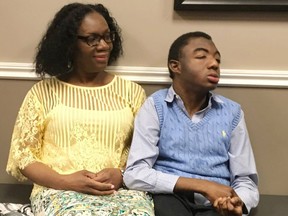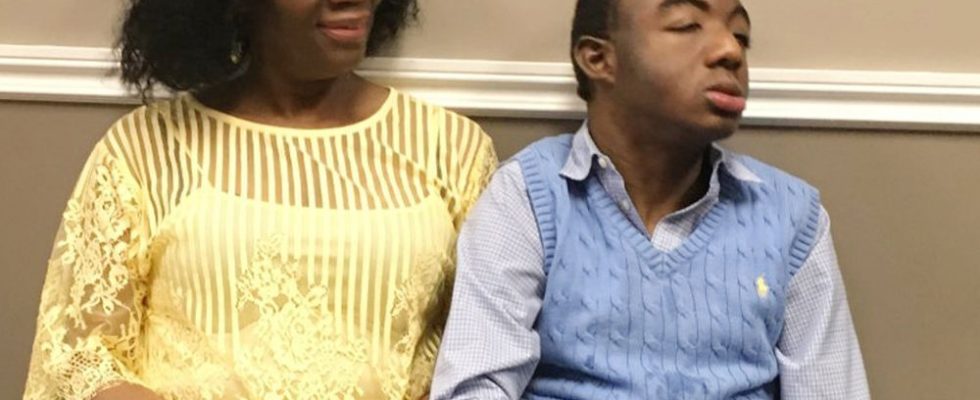
Mandatory training to identify early symptoms of aspiration should be provided to all medical, classroom and student support staff, says a coroner’s jury at inquest into the death the Samuel Brown.
Advertisement 2
The recommendation, one of 21 compiled by the jury, aims to ensure those working at provincial demonstration schools like W. Ross Macdonald are able to identify the early symptoms of serious injuries common to those students with intellectual and developmental disabilities.
The jury is also recommending that the provincial schools branch of the Ministry of Education, review the availability of medical resources with overnight student lodgings to ensure timely access to medical practitioners is available to students.
The recommendations come after eight days of testimony during the inquest.
An 18-year-old deaf/blind student from Brampton, Samuel was a long-time student at W. Ross Macdonald School who stayed in student lodging at the Brantford school during the week.
Advertisement 3
During the inquest, which began Aug. 28, the jury heard that Samuel was transported to Brantford General Hospital on the morning of Feb. 8, 2018 after school support staff found him unresponsive. Staff had entered Samuel’s room to change him.
A supervisor was called, 911 was called and Brantford firefighters and Brant-Brantford Paramedics responded. Life-saving efforts were unsuccessful and Samuel was subsequently transported to hospital.
Jurors also heard that Samuel had been examined by two school nurses and two school support staff checked on him every 30 minutes overnight on Feb. 8-9, 2018. Samuel had a fever at 9 pm on Feb. 8, and given Tylenol. When checked at 1 am Feb. 9, his temperature was found to be in the normal range.
Advertisement 4
However, testimony revealed that while school staff were aware that Samuel frequently appeared congested with a runny nose they were unaware that he had a history of pneumonia.
As part of its deliberations, the jury determined that Samuel died of natural causes due to acute bronchopneumonia. He died at Brantford General Hospital at 7:09 pm Feb. 9, 2018.
During testimony jurors heard acute bronchopneumonia is a bacterial infection of the lungs where air spaces become filled with inflammatory cells. It takes a number of hours for the inflammatory cells to start filling up the lungs.
The jury is also recommending that all provincial demonstration schools be mandated to develop protocols for ongoing monitoring, documenting and interdisciplinary consultation among staff concerning changes in student behavior and medical symptoms.
Advertisement 5
The protocols should include an emphasis on identifying and flagging early signs and symptoms of potentially serious illness.
The provincial schools branch should also implement policies and procedures to enhance 24-hour on-call availability of medical staff for students in lodging.
Dr. David Cameron, the presiding officer of the inquest, thanked the jury for the hard work they put into the recommendations.
“I truly believe that our future students will be safer as a result of having explored the developments and material issues of this inquest in producing these recommendations,” Cameron said.
Saron Gebresellassi, the lawyer for the family of Samuel Brown, said the family still has questions about Samuel’s death.
Advertisement 6
“It is good for society that Samuel Brown’s death did not escape a coroner’s inquest,” Gebresellassi said in a statement. “However, concerns persist.
“This matter remains under careful review.”
At issue is the refusal one of the school’s support staff who checked on Samuel every 30 minutes overnight on Feb. 8 to 9 2018 – to provide live testimony at the inquest. The worker was excused from testing due to health reasons.
Gebresellassi brought forth a motion to the inquest to compel the worker to testify, but Cameron declined to hear it for a couple of reason.
Cameron said hearing the motion would force a delay in the inquest, which was already taking place five years after Samuel’s death.
Cameron noted, in his decision that while the witness would not be available to provide live testimony, the inquest did have the benefit of the staff member’s notes, which were prepared immediately after Samuel’s death.
Advertisement 7
However, Cameron acknowledged that, because the witness had been excused, her recollections couldn’t be challenged or tested under oath through questioning by counsel.
Other jury recommendations include:
- Ensure wheelchair accessibility at all entrances and ensure they are maintained to allow safe access for emergency personnel.
- All phone locations should be equipped with signage identifying the address, including the building number and phone extension to direct emergency personnel to the proper location.
- Invite paramedics and firefighters to tour the school to ensure they are familiar with the school grounds.
twitter.com/EXPVBall

Comments
Postmedia is committed to maintaining a lively but civil forum for discussion and encourages all readers to share their views on our articles. Comments may take up to one hour for moderation before appearing on the site. We ask you to keep your comments relevant and respectful. We have enabled email notifications—you will now receive an email if you receive a reply to your comment, there is an update to a comment thread you follow or if a user you follow comments. Visit our Community Guidelines for more information and details on how to adjust your email settings.
Join the Conversation